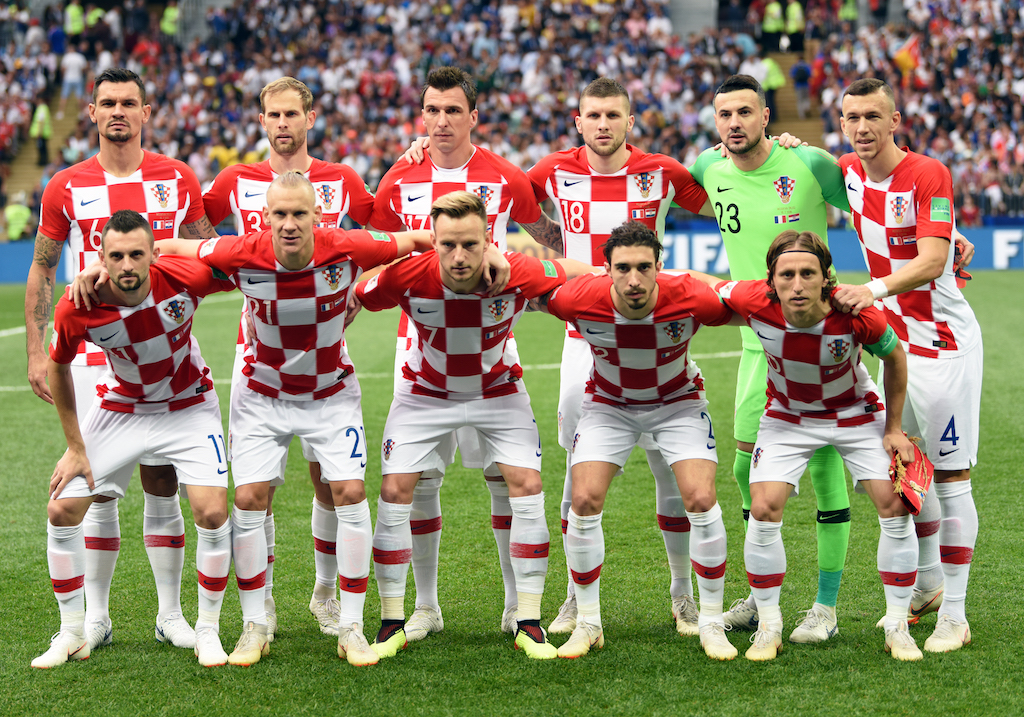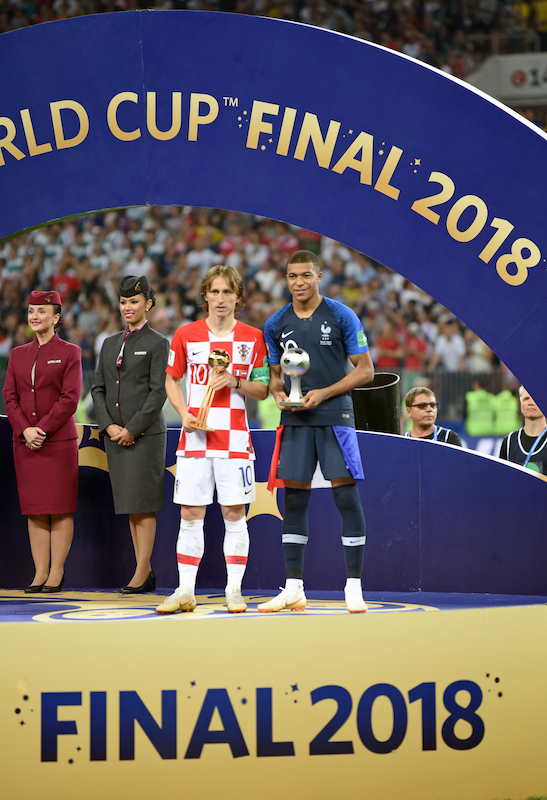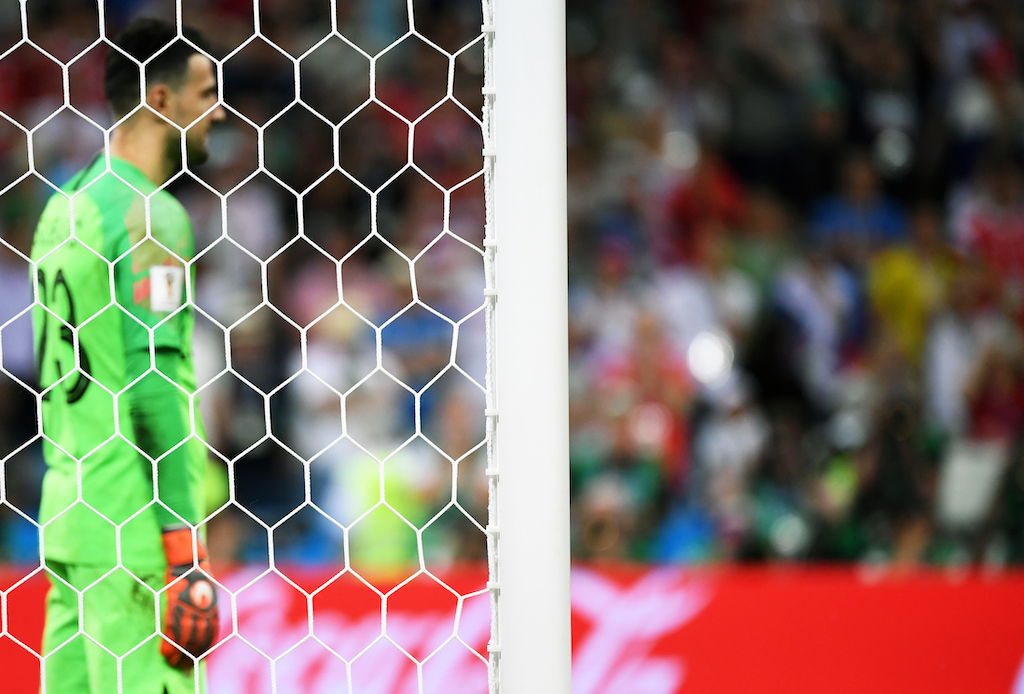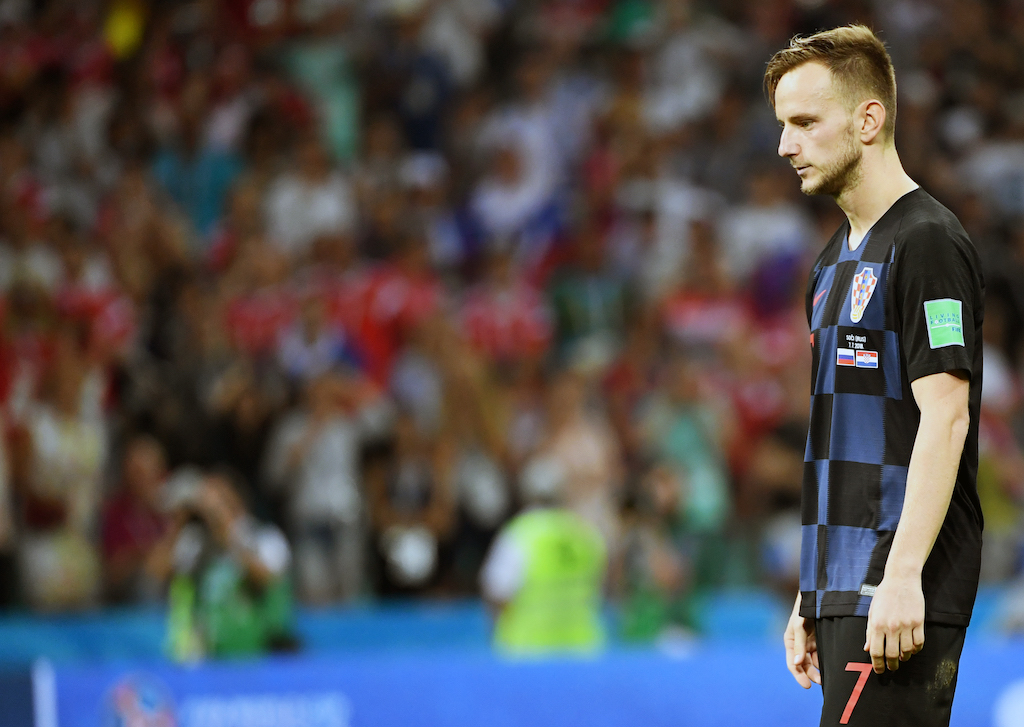International Poetry Day Croatia: Non-Croatian Poets about Croatia
March 21, 2021 - In honour of International Poetry Day Croatia, TCN's Ivor Kruljac met with non-Croatia poets to share their views on Croatia through their art.
Since 1999 and the 30th General conference of UNESCO, March 21 is recognized as International Poetry Day. As said by the United Nations official website, the date was dedicated to poetry to celebrate „one of humanity’s most treasured forms of cultural and linguistic expression and identity“, which history remembers practiced in every culture on every continent.
„Poetry reaffirms our common humanity by revealing to us that individuals, everywhere in the world, share the same questions and feelings“, states the UN.
Supporting linguistic diversity and an opportunity of endangered languages to be heard within their communities along with encouragement to bring back the oral tradition of recitals, the promotion of poetry teachings and poetry in the media, as well as connecting this ancient art form with other art forms such as music, painting, and theatre, are all goals of the International Poetry Day. And here at TCN, we want to do our part and connect poetry with what we always struggle to report on: Showing all aspects of Croatia.
To the fans of contemporary poetry, it's no secret that poets today are very much alive, productive, and regularly present their work. If not in books then at poetry events, open-mics, and on social networks – either from their private accounts, blogs, or in groups dedicated to this wordy-art.
We asked non-Croatian poets through social networks and private group chats dedicated to poetry who either visited Croatia or know about Croatia to send us poems about Croatia with a promise that the top 5 will be published and authors presented. Now, to be fair, while the author of this article is a poet, that is far from being a legitimate poetry critic and the rest of the TCN's editorial team (at least to public knowledge) aren't even poets. The idea was to pick the poems based on how it resonates with us as individuals who gave the art a chance. The academic acknowledgment is nice, but resonating with the audience, the everyday people, should be the goal of any art publically displayed, right?
To be honest, there wasn't really any competition as, by the end of the deadline, we received only four poems. Nonetheless, the beauty of these poems and great resonation with TCN was there and we are happy to publish these poems and ranked them, from fourth place to the very best. You can decide for yourselves which poem you like best (and the messages you see in their work), but here the four poems that „knocked on the doors of our mailbox“ (metaphorically, quite poetically, speaking).
#4: „Croatia“ by Jesus McFridge
Poets such as Charles Bukowski and Walt Whitman are very well known by their name, but just as in many other arts, poets are no exception in sometimes preferring to use pseudonyms to present their work while keeping their identity unknown and privacy secured. Such is the author that goes by the name of Jesus Mcfridge. Quite active in a Facebook group Poetry Criticism For Cool Cats, he revealed in his application that he is from California and described himself as a „24-year-old American that watches too much television“. He added that his knowledge of Croatia is limited to the country at the 2018 FIFA World Cup, but he has fallen in love with the Croatia national football team's checkered uniforms. Despite never visiting Croatia, after „Croatia's tragic loss in the 2018 World Cup final“, he found himself also crying just as many Croatians did.
„In this poem, I have attempted to capture the feeling of this tragic loss that we have shared together, despite the vast seas that separate us“ concluded Mcfridge in his application.
His bittersweet poem simply titled „Croatia“ indeed brings some painful memories but presented in a short and funny way allows us to look at the past in a brighter way, bring back smiles, and give us the strength to cheer for our Croatia national team as they prepare for the next trophy hunt.
Croatia
They
Almost won
The world cup
But
Mandzukic scored
An own goal.
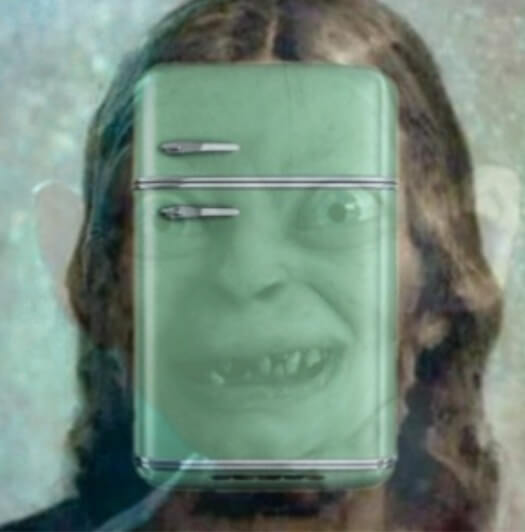
Jesus Mcfridge © Jesus Mcfridge
#3 „Daniela's song“ by Christian Sinicco (English translation by Daniela Sartogo)
Christian Sinicco was born in Trieste, Italy, and his poetry is published in various anthologies and magazines and an editor of the magazine Argo with which he has dealt with the widest overview of poetry in the Italian dialect from 2000 to the present day. He published three books of poetry: „Passando per New York“ (Lietocolle, 2005), „Ballate di Lagosta“ (CFR, 2014) and „Città esplosa“ (Galerie Bordas, 2017). He won the first Italian Slam Poetry Championship and served as the president of the slam poetry association LIPS - Lega Italiana Poetry Slam (2013-2014) and is the current vice president of Poiéin. He is also active in a global initiative of slam poets organizing the world slam championship which early results can be followed on Twitch.
He participated in numerous book festivals including four festivals in Croatia: Zagreb Contemporary Poetry Festival, Forum Tomizza (in Umag), Pula Book Fair, and Rijeka Book Fair.
His second book of poetry „Ballate di Lagosta“, translates as Lastovo Ballads and it's actually a preview while Sinicco plans to soon publish the full book dedicated to this beautiful Croatian island on the southern coast.
„I was on Lastovo several times. I know a poet from there, Marijana Šutić and I spent a vacation there with other poets such as Ivan Šamija and Silvestar Vrljić“, said Sinicco in his application where he offered a poem from „Lastovo ballads“ which already seen its presentation on a prestigious literary site Versopolis.
„Daniela's Song“ may not bring out the most visual and most explicit Croatian motives, but the discrete and specific localization of Croatia is there all wrapped in a love poem to touch the heart and help us remember the summer sweethearts and romance in Croatia.
Daniela's song
I.
She talks about how beautiful it is without knowing where to go
perhaps into the water of the sun like her cheek
simply necessary as the wet dream
in a wider galaxy if it can be understood,
she seduces you through valleys and dusty vineyards
with eyes towards the bay with the waterfall:
Za Barje the sign said, and so also barked the dog tied
under the cypress – his teethed mouth was the buried reason
the fishermen had left him there – near a house
covered with ivy and blackberries, in which had grown
an apple tree with sour fruits and roses
that only you will taste:
avoiding the asphalt and dirt road holes you followed Daniela
targeting yourself and the asphyxia of your life
that follows the path to erect the intelligence of the species
that on the concept of work has built its republic of theft,
then you saw her dancing on the beach between the warm rocks
and the boat pulled out of the lobster pot, the fishermen are back:
good and evil are triangles of waves that spread
on the sea towards the two islands where we swam
– the fish are not aware of it,
and so the man under the pine and his child
with the mask, another fisherman with the fishing line,
only you maybe on the petals you bite as the words
II.
after quite a while we are outdoors and eat figs
at dusk time on this meadow
sliced on the wooden bowl,
we take the bread and tear it many times
because paradise is close to the fire
and the village to our left rises white in pink
made with scales like the barracuda
Korčula has no intention to leave our sight
I shouted as my usual self
you lit the candle and made me notice
we are not alone, but you can stay calm
slowly also the hut
and its fire have become attractive
calming the natural tension
of a darkening sky, not preventing us
from tasting the happiness
of a grilled fish, of tomato and capers
you are attractive when you smile
with a glass of water on the lips
too quietly they get up,
wanting to be born in the response they seek outside
the people at the tables next to us, and from the cottage
where they grill they come to clear up
a woman and the cook, as in a ceremonial
we ask for the check with the hands
they will be intertwined when we emerge from the field
toward the parking lot where we’ll get in the car
and head out to the highest point
of a series of bends, before descending to the valley
the vault of stars surprises us
we stop everything, propped on pillows of a land
that is still hot, we’re sure
that the star will fall, and it comes true
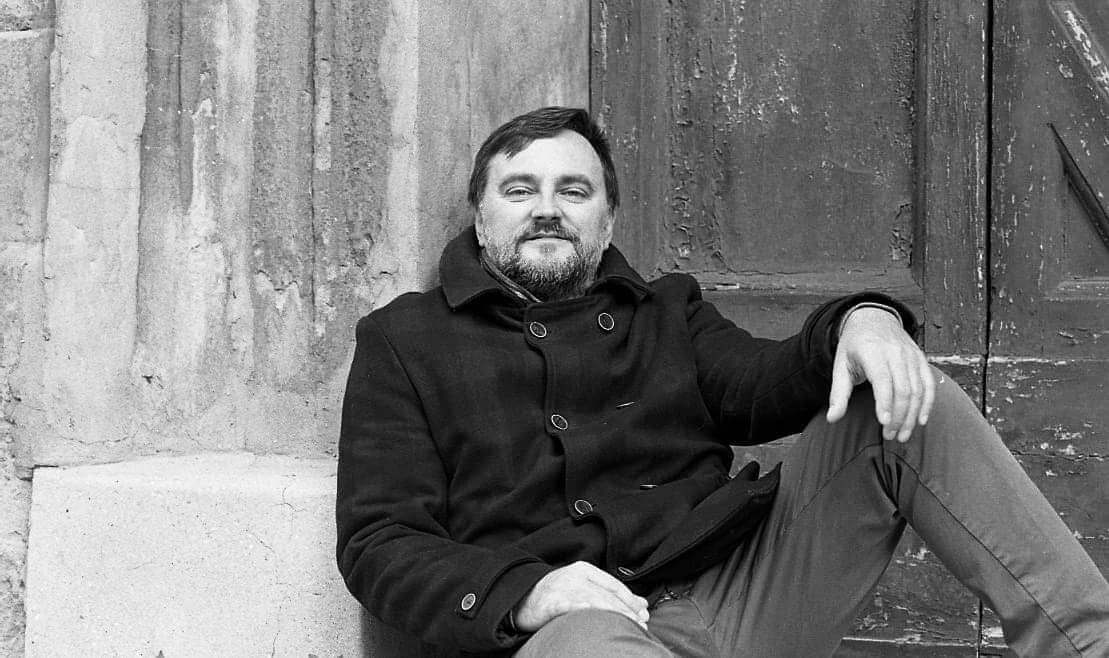
Christian Sinicco © Daniele Ferroni
#2 „The Lakes of Plitvice“ by Vanni Schiavoni (English translation by Graziella Sidoli)
Born in Manduria, Italy, but living in Bologna, Vanni Schiavoni published five poem collections: "Nocte" (1996), "The Suspended Balcony" (1998), "Of Humid and Days" (2004), "Salentitude" (2006), and "Walnut Shell" (2012). He also published two novels "Like Elephants in Indonesia" (2001) and "Mavi" (2019) and edited the poetic anthology "Red - between eroticism and holiness" (2010). Most recently, he also published poetical plaquette „Croatian Notebook“ which features twelve poems dedicated to six Croatian sites: Plitvice Lakes, Kornati, Šibenik, Trogir, Split, and Dubrovnik. Schiavoni wrote the "Croatian Notebook" after a week-long journey in the summer of 2017. His birthplace Manduria is located in the region of Puglia which is 30 miles away from the Pelagosa (Palagruža), the most distant Croatian island, and his surname originates from the name of the Slavonia region in Eastern Croatia.
„For me, it was not just a holiday trip but a journey in and out of everything that I am, a travel diary through which to bring out the game of mirrors between me and that place, between what I am and where I come from and what I have encountered“, said Schiavoni. This journey impacted him with images of the signs of Italy engraved in stone, mournings of the war, communist history („most heretical Communist party in the east in front of the largest Communist Party in the west“, as Schiavoni puts it) and as he added, „the same Adriatic Sea which gives both of us fishes and earthquakes“.
His poem „The Lakes of Plitvice“ is a lovely description of the mixture, the game, and visual eye-candy of the waters in Croatia's oldest National Park, and it linked with a search for bravery and the encouraging point that good and beauty can defeat evil and change it to something better.
THE LAKES OF PLITVICE
The first day they always plunge down into the same spot
the river rapids that come to the encountering
of the white river with the black river
and the more we think ourselves ready with our shrewd eyes
the fewer the adjectives made available to us before that wonder:
the green rush pushes our pupils towards a wild frenzy
it pushes them inside the tearful torrents by our feet
in the shrouded darkness of the sequential caves
and in the vertical caverns sculpted
as if by a hand capable of it all.
Yet Judas must have passed by this place
and though perhaps not the one with burning lips
a simple Judas must have become lost
in this mysterious grid of remorse.
These lakes fall into lakes as lashings on yielding branches
they flow into other waters and so they rain
endlessly
and perfectly untouched.
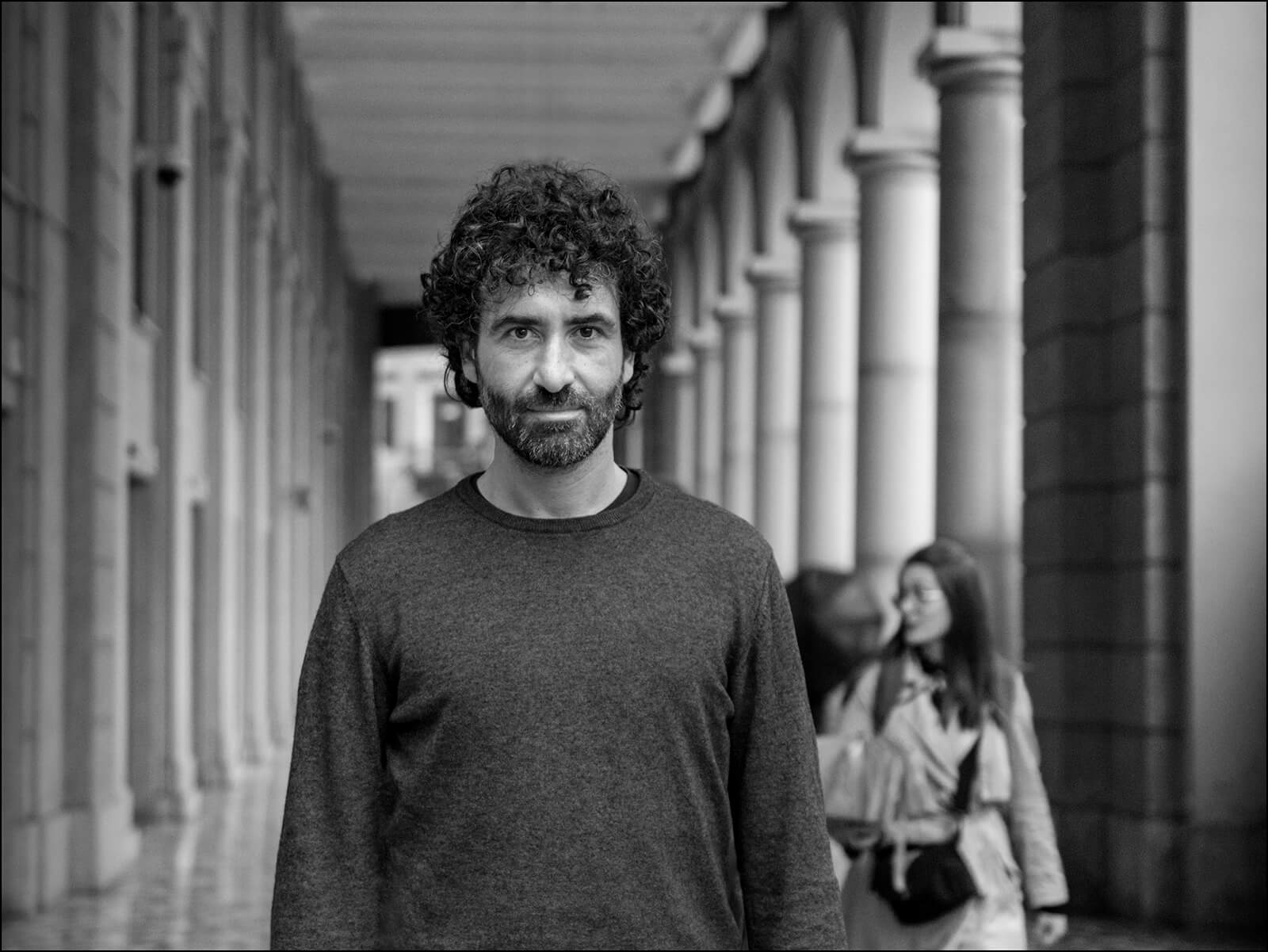
Vanni Schiavoni © Dino Igmani
#1 „Dubrovnik Rock“ by William Vastarella
After Schiavoni and Sinicco, our first-ranked poet is the conclusive evidence there is something so incredible about Croatia it really inspires poetically-inclined neighbors across the Adriatic. Born in Napoli in 1974, William Vastarella is a teacher of Italian Literature, geography, and History. He's has a Ph.D. in semiotics from the University of Bari and writes for several literary and cultural magazines in Italy. He also edited several poetry anthologies as well as semiotic essays. Vastarella visited Croatia several years ago and had a cultural and relaxing holiday on the seaside. „I found her so full of the Mediterranean spirit that I wrote a poem in Italian. I tried to translate it in other words, trying to leave intact the sounds of that memory“, said Vastarella about his poem on Dubrovnik.
The poem „Dubrovnik Rock“ is fantastic in the way, Vastarella visually invokes the images from the history of Dubrovnik (Ragusa) Republic and the relationship it had with Italians at that age with the waves of the Adriatic Sea as the link between Italy and Dubrovnik but also between past and present.
Dubrovnik Rock
Other singers claim to feel
singular vibes in the waves
Nearby this shore,
and so do I.
Ragusa, Dubrovnik
A name is not enough
To trap a soul.
I ask myself
Who’s the other side
Of the other side
As the seawater shuffles.
I touch with my finger
and now I know it’s real
the steel and the wood of the boat
powerful works of man
that wipe out weapons
and I ask no more.
I realize
we have been both
pirates and emperors
centurions and barbarians
through the centuries
each one to the other
a flurry flow
of slavers and Slavs,
slayers and saviors.
Sometimes when the north wind blows,
melting the white in waves,
painting clouds of amazing blues
mirroring the water in the sky,
space seems to become so narrow,
so easy the neighborhood,
then all
the voices of the ancient age
of an ancient game
of thousands lost
in that spot of time,
that spot of sea,
mutate in a mute roar singing
in which merge the rage of riot
and the call for help of a lot
castled in the rock
waiting for a drop of rain to drink
or friend sails on the horizon.
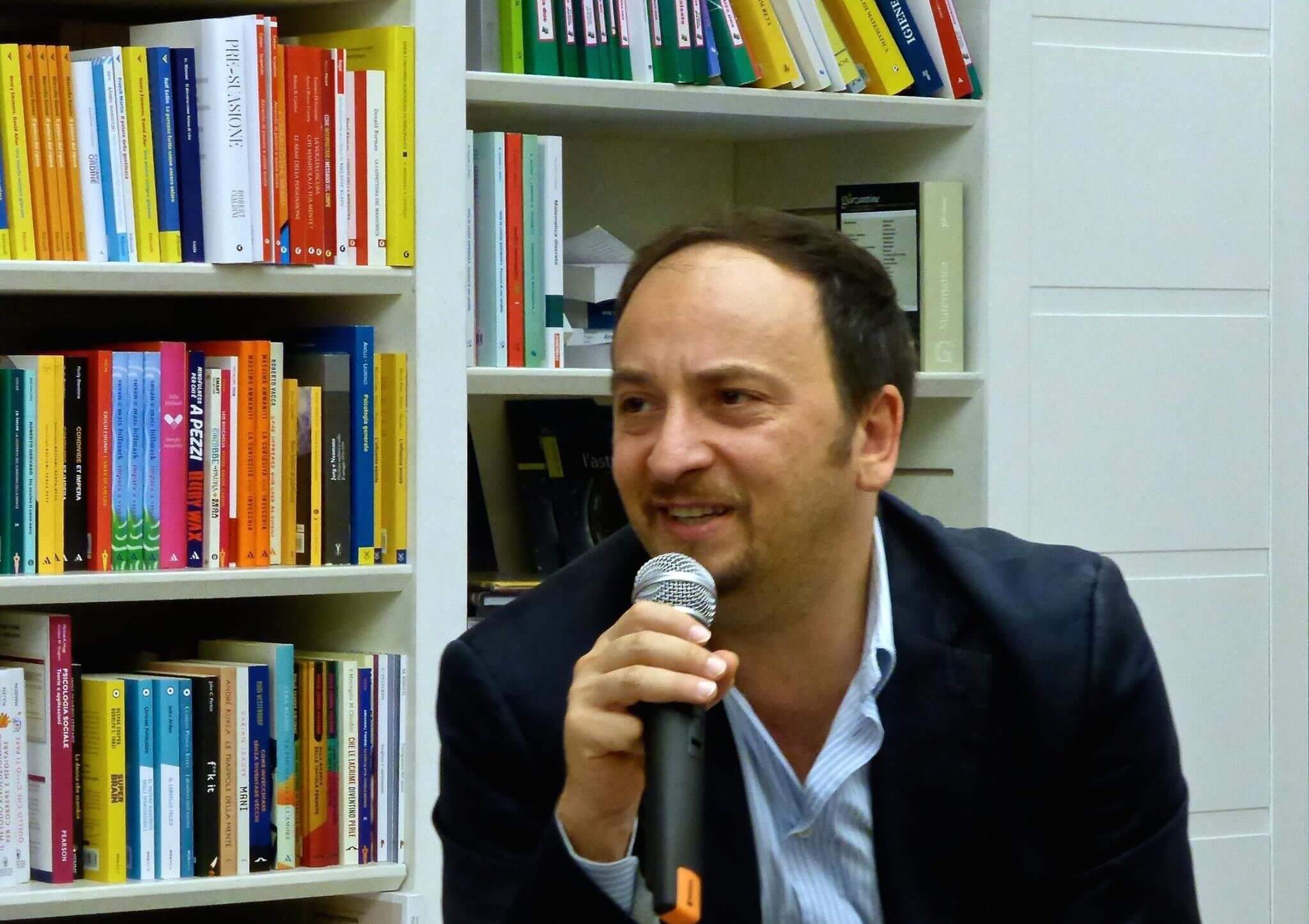
William Vastarella © Vito Signorile
For more about lifestyle in Croatia, follow TCN's dedicated page.
Split Remembers Croatia's World Cup Success on Riva Today
Tuesday, July 16, 2019, is one year since the Croatia national team returned from Russia as World Cup finalists. The Split Tourist Board wants you to help them commemorate the first anniversary of the greatest hero’s welcome in the history of the country.
On Monday, Croatia remembered one year since that historic World Cup final in Russia against France. Today, cities around the country will come together for the ‘Day of Unity, Pride, and Happiness’ as a way to remember a time when Croatia came together unlike ever before - to welcome the Croatia national team on July 16, 2018, after their outstanding World Cup campaign.
July 16th is remembered as a day when the hearts of all Croats were full with a sense of unity, pride and joy. Thus, at the initiative of coach Zlatko Dalić’s "Organizers Without Borders", the City of Split and the Split Tourist Board, you are invited to relive July 16, 2018.
“Put on your checkered jerseys and come to the Split Riva on Tuesday, July 16 from 17:00 to 23:00 where there will be a program in honor of our Vatreni. Special surprises await visitors in the most original checkered jerseys and Croatia fan gear,” said the Split Tourist Board.
You can find the program of events below:
5 pm - a custom musical program- a retrospective of summer 2018 by DJ Joke
6 pm to 7:30 pm - Boston City Singers
7:45 pm to 8:30 pm - special fan music program by DJ Joke
8:30 pm to 9:00 pm - projection of the Croatia national team welcome in Split
9:05 pm to 11 pm - an entire concert by the group Best, all music adapted to the fan atmosphere
This is your chance to join the Split Tourist Board in remembering the magnificent success of the World Cup in Russia.
To read more about lifestyle in Croatia, follow TCN’s dedicated page.
On This Day One Year Ago, Croatia Became World Cup Finalists
July 15, 2019 - On July 15, 2018, the Croatia national football team achieved the greatest success of any sports team in the history of the country. On July 15, 2018, Croatia became World Cup finalists.
Like most Croatians around the world, I’ll never forget July 15th - and the emotions that come with remembering that date one year on are just as overwhelming.
However, also like many Croatians around the world, I initially presumed that a shot at the World Cup final was impossible. For starters, while we’re always full of pride, Croatian fans are also shockingly realistic. Recall, this squad was constantly plagued by poor coaches and lousy luck - curses that not even Luka Modrić could reverse. And at this World Cup, we had to overcome Argentina (and Lionel Messi) to get out of our group. Impossible.
But that summer in Russia carried a different aura. We had a new coach that Croatians could relate to, even though we knew nothing about him before he was called to lead the team through the biggest tournament in four years. After an atrocious year under Ante Čačić which killed our dreams of advancing to the World Cup at all, Zlatko Dalić restored our faith in the simple fact that he knew tactics and where to position our players who fought for the biggest football clubs in the world. But most of all, Dalić revived a team that was dull, disoriented, and disheartened from the failures experienced before, and returned a wave of positivity to the squad that had been missing since Croatia’s World Cup bronze in 1998. Croatia under Dalić had a spark in their eye - and one that ultimately lit the way for the country’s first ever World Cup final.
Croatia’s road to the final really showed its legs once they tragically topped Argentina 3:0 in the group stage - a result that is still hard to believe one year later. Croatia finished at the top of their group, and fans around the world gained faith in the fact that if Croatia continued to play like this for the remainder of the tournament, they could upset anyone.
But as all things Croatian require a splash of drama, this team took the long road to the final, one that came with twists, turns, and numerous bouts of nausea. In the round of 16, Croatia met Denmark. While Denmark was a team that shouldn't have been underestimated, considering they flaunt Tottenham superstar Christian Erikson in their ranks, Croatia was expected to pass without too much difficulty - though that quickly changed after Jorgensen scored for Denmark in the first minute of the game. Croatia was lucky to equalize from a Mandžukić goal three minutes later, but their wearied bodies on the pitch denied them another goal, and the game went to extra time. Croatia had the chance to seal the deal after Ante Rebić was fouled in the penalty area, though captain Luka Modrić missed - and Croatian fans began familiarizing themselves with that fatal fact that it just wouldn’t be their year. However, heroics from goalkeeper Danijel Subašić saved the day in the penalty shootout - and Croatia secured a spot in the quarter-final against Russia.
Another grueling 90 minutes against the host nation that ended in a tied result pushed Croatia to another extra time, another draw, and another penalty shootout. Croatia’s spark had to fizzle now, I thought. But they were fearless. After fortunately failed penalties from Russia, Ivan Rakitić stepped up last and sent Croatia to their second World Cup semi-final ever.
Croatia met England in the semi-final, a team also riding a wave of zeal and self-confidence as their fans thought they'd win it all. It was England’s first World Cup semi-final in 28 years. On the eve of the semi-final, journalists around the world questioned if Croatia had the stamina to surpass England, a nation who thought it was their year to bring football home, and who had an advantage over Croatia because their last two games didn’t move to penalties. Croatia was said to be mentally and physically exhausted after brutal battles against Denmark and Russia, and the legs on their fairytale were destined to buckle.
Many of us worried that the media’s prophecy would be true after Trippier scored for England just five minutes into that historic semi-final at Luzhniki Stadium in Moscow. Croatia’s fatigue hardly carried them through the first half, which ended at 0:1 for England. Even the biggest believers in Croatia questioned if football really was going home to England that year.
But Croatia’s second wind carried them through the second half, and Ivan Perišić scored the equalizer in the 68th minute. As the clock ticked to the final minute, time stopped for Croatian fans who feared they didn’t have a nerve left to spare to get them through another grueling extra time - especially one that decided their fate in the World Cup final. But with 10 minutes to go, Mario Mandžukić confirmed just why he is our Super Mario - and scored the goal that assured Croatia’s first ever World Cup final. The country erupted into madness.
I remember the day of the World Cup final clear as day and as a total blur - like a dream you wake up wondering if it actually happened. The nation was more united than ever, we were honored, full of spirit, and football fans around the world had jumped on the Croatia bandwagon to watch the happy ending of our fairytale unfold. And in the end, it didn’t matter that the outcome wasn’t in Croatia’s favor.
Slobodan Kadić
Croatia and the powerhouse that is France met in the World Cup final on July 15, 2018, at the Luzhniki Stadium in Moscow. Decked out in their classic red and white checkers, Croatia came out playing the best football they had all tournament. An unlucky own goal by Mario Mandžukić put France in the lead in the 18th minute, though a left-footed rocket from Ivan Perišić made it 1:1 ten minutes later.
A dreadful and quite questionable penalty was awarded to France after the referee consulted VAR - and Antonine Griezmann scored for 2:1 at the half.
Croatia’s chances dimmed after Paul Pogba and Kylian Mbappe scored in the 59th and 65th minute for 4:1, though Croatia wouldn’t let the negative result stop them from tenaciously fighting through their first World Cup final. Mandžukić managed one more for Croatia in the 69th minute for 4:2, and France ultimately won the World Cup title.
Though Croatia was defeated by a result that didn’t correctly reflect their heroics on the pitch, they had just achieved the greatest sporting success in the history of their country.
While Croatia failed to become World Champions, their team did feature the best player of the World Cup, Luka Modrić.
"I'm sad because we lost, but I'm proud of everything we did in Russia. The feelings are mixed, but surely when the time passes, we will become aware of the incredible success we’ve achieved,” Modrić said a year ago, and went on to win every individual football award that season.
Slobodan Kadić
And thanks to Croatia’s hero's welcome in Zagreb which continued throughout the country for weeks, you’d think Croatia won it all.
To read more about sport in Croatia, follow TCN’s dedicated page.
July 11th: When Croatia Won Two Most Important Games in its Football History
July 11, 2019 - July 11th is a historic day for Croatian football. On July 11, 1998, Croatia defeated Holland to secure the bronze medal at the World Cup in France. And on July 11, 2018, Croatia beat England for a spot in their first ever World Cup final.
I’m not sure any summer can top the summer of 2018 in Croatia, which we’ve been reminded of especially over the last few days as we mark one year since Croatia’s historic World Cup campaign.
My morning was met with a social media feed full of videos reminiscing about Croatia’s win against England in the semi-final of the World Cup in Russia. The streets were lined with red and white checkers, bodies were propped on the tops of cars, and Croatian flags waved with glory in the hot summer air. The sky glowed pink from flares, the sounds of car horns and loudspeakers blasting Croatia’s favorite patriotic songs filled every public square across the country, and the nation, for the first time in a long time, came together as one.
On July 11, 2018, Croatia achieved its best ever result in football history, though not many believed they could. On the eve of the semi-final, journalists around the world questioned if Croatia had the stamina to surpass England, a nation who thought it was their year to bring football home, and who had an advantage over Croatia because their last two games didn’t move to penalties. Croatia was said to be mentally and physically exhausted after brutal battles against Denmark and Russia, and the legs on their fairytale were destined to buckle.
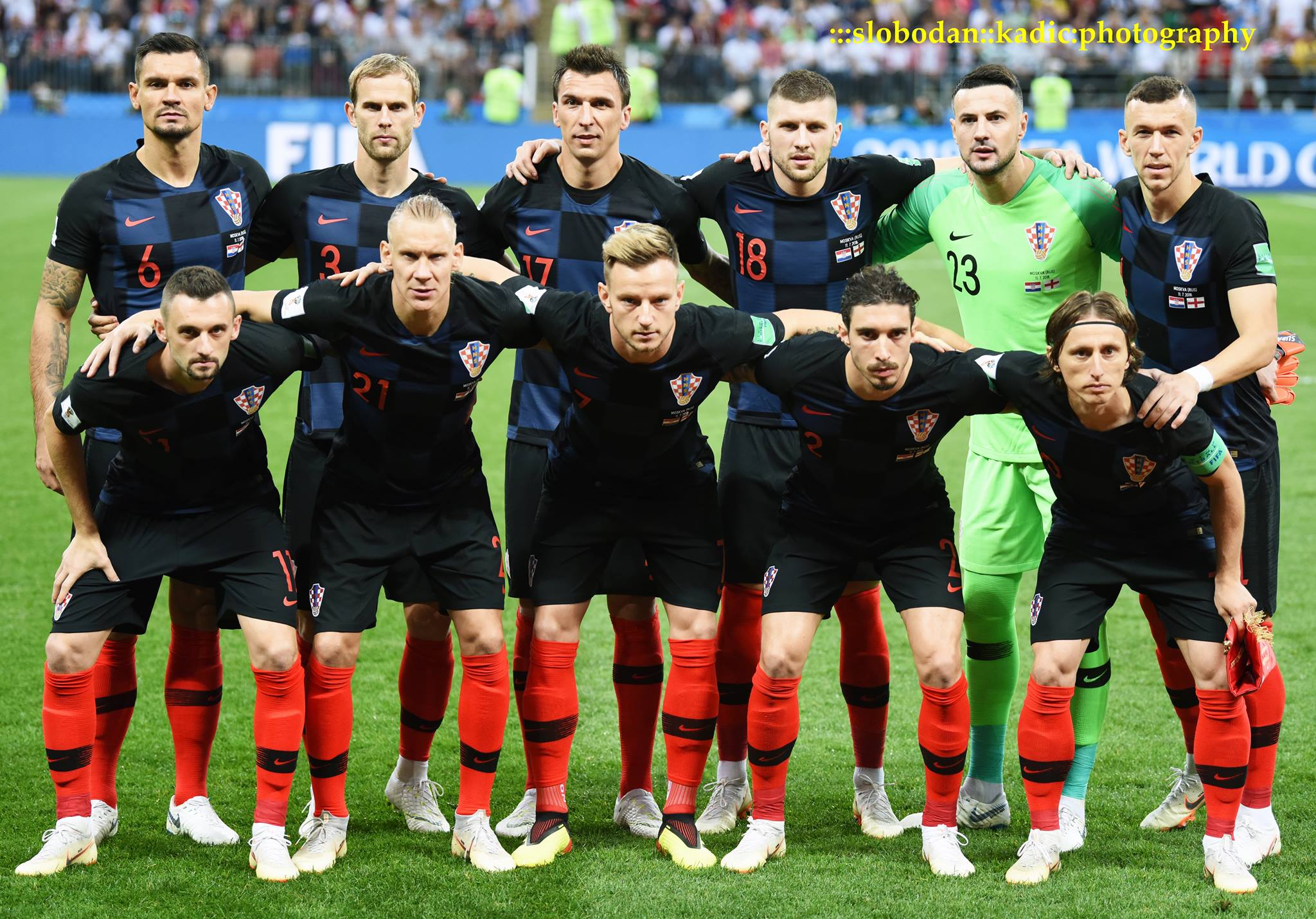
Slobodan Kadić
Many of us worried that the media’s prophecy would be true after Trippier scored for England just five minutes into that historic semi-final at Luzhniki Stadium in Moscow. Croatia’s fatigue hardly carried them through the first half, which ended at 0:1 for England. Even the biggest believers in Croatia questioned if football really was going home to England that year.
But Croatia’s second wind carried them through the second half, and Ivan Perišić scored the equalizer in the 68th minute. As the clock ticked to the final minute, time stopped for Croatian fans who feared they didn’t have a nerve left to spare to get them through another grueling extra time - especially one that decided their fate in the World Cup final. But with 10 minutes to go, Mario Mandžukić confirmed just why he is our Super Mario - and scored the goal that assured Croatia’s first ever World Cup final. The country erupted into madness.
“How did I feel at that moment?” said Mandžukić. “I don’t know… I can’t find the words. I can’t; it was indescribable.”
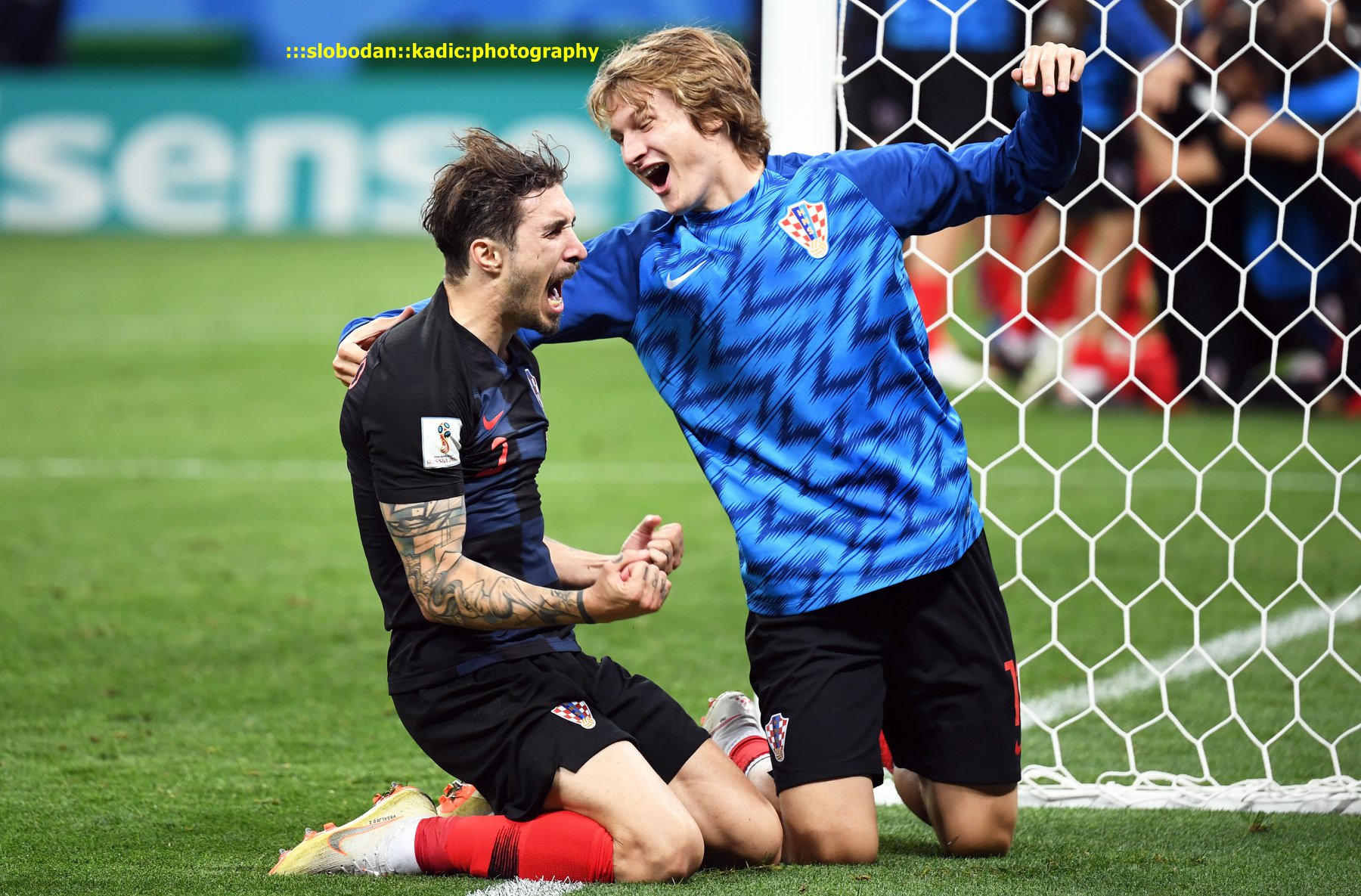
Slobodan Kadić
Which is a fair assessment to what most Croatians would say when looking back on that day. And I'd agree - it was indescribable.
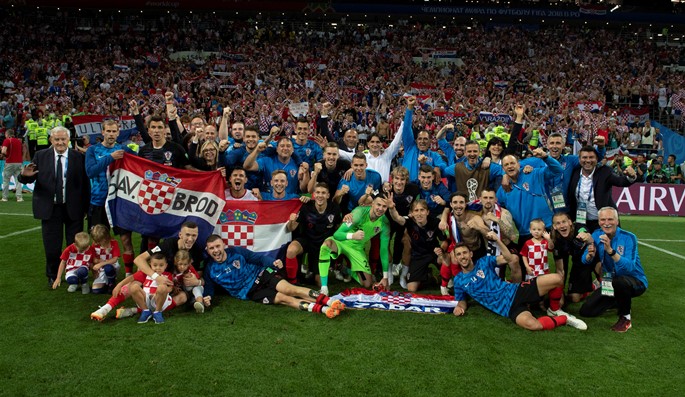
HNS
Thus, on July 11th, in the space of exactly twenty years ago, Croatia incredibly won two of the most important victories in its football history.
To read more about sport in Croatia, follow TCN’s dedicated page.
Remembering World Cup: Ivan Rakitić Declares Day of Unity, Pride, and Happiness in Croatia
July 10, 2019 - For Croatians, July 16, 2018, is a date that is saved in our memory bank for a lifetime. One year later, the unity, pride, and happiness experienced in Croatia then will be recreated.
Like yesterday, we remember Croatia’s outstanding World Cup in Russia, which secured them a spot in history books after they came home with the silver medal.
“There is no better feeling than being a Croat. This is a historic match for us, not just for the 22 of us here, but for the whole country. Tomorrow, we will have 4.5 million on the pitch,” said Ivan Rakitić before the big final last year to 24 Sata.
But even before that last game in Russia, Croatia already won the hearts of football fans around the world, whether they had Croatian blood or not. Win or lose, the only way the fans could show their appreciation was with a spectacular welcome on July 16, 2018,after an incredible World Cup campaign in Russia. More than half a million people ran to the streets of Zagreb and waited more than five hours for the team bus to make it from the airport to Ban Jelačić square, which was followed by a series of ‘welcome home’ parties across the country in the weeks after.
But it has been one year since the summer of a lifetime; one year since Zlatko Dalić and his team met France in the final on July 15th, and one year since Croatians near and far pushed to the streets to show their pride.
Thus, Ivan Rakitić is urging Croatians to remember the summer of a lifetime, awaken the red and white checkers in their heart, and get out on the streets of Croatia once again to remember this pertinent date in Croatian history.
“On July 16, everyone put on your checkers and head out to the streets. Let’s celebrate the day of unity, pride, and happiness. Croatia is full of life, let's show it,” Rakitić said in a video he posted on his Instagram.
Zlatko Dalić and Lovre Kalinić also invited Croatians to take part in the new celebration.
To read more about lifestyle in Croatia, follow TCN’s dedicated page.
Reflecting on Russia: Croatia Secured World Cup Semi-final One Year Ago Today
On July 7, 2018, Croatia and Russia met in front of 40,000 fans for the quarterfinal of the World Cup in Sochi. The stadium shook like an earthquake.
It was rumored that Vladimir Putin, the KGB, and special units helped Russia reach this stage of the competition, though nothing could help the host nation that night in Sochi. Croatia won on penalties and thus secured a spot in the World Cup semi-final, reports 24 Sata on July 7, 2019.
Judging by the game against Denmark, after Russia, it was clear the entire country needed psychiatric help, or pills to pop to get them through over 120 brutal minutes. This quarter-final was not for the faint of heart.
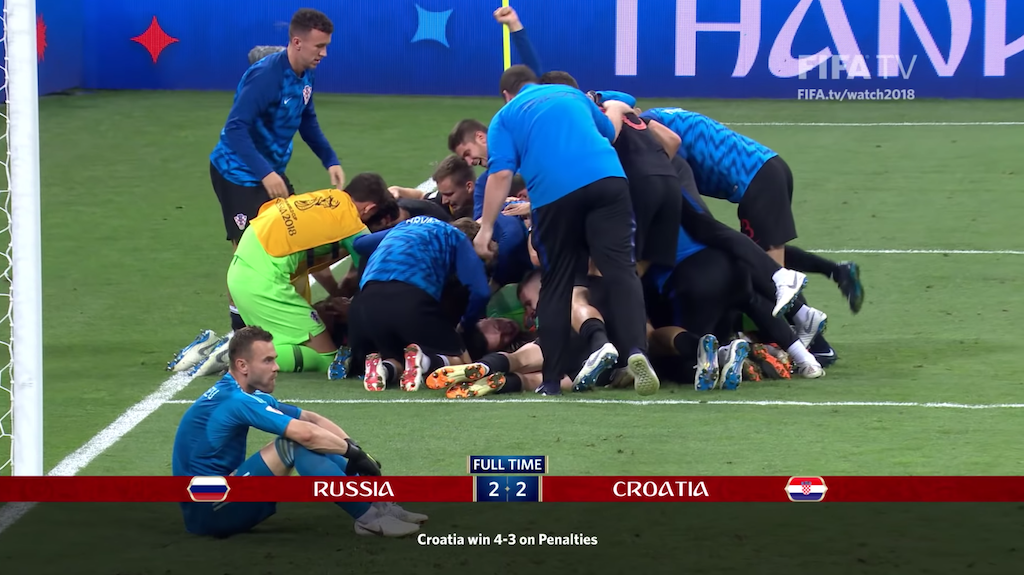
It was a game where Danijel Subašić fought through the pain to magically save a penalty with one foot,
“During the warm-up, I felt pain in my muscle. I massaged my leg and saw that I could continue. The pain came again later, but I did not want to give up, I knew that the coach needed another substitution because many of them complained about problems,” said Subašić.
However, Suba became a hero, a hero of the nation, who eliminated Russia and Denmark.
Many players could barely stand on their feet during the game and looked at the bench after any hope a change could be made.
"I do not know where they gathered their strength, they made a miracle," coach Zlatko Dalić said.
“During the break, masseuses quickly served the players, as in a Formula 1 box. I had a small edema, but I survived, as we survived the entire tournament,” said Subašić.
After 90 minutes, the game was 1:1, and after 120 minutes - 2:2. Croatia's fate would be decided by penalties for the second consecutive game.
But after the team and Croatians across the world spent all of their nerves against Denmark, how would anyone survive this drama again?
“How did I survive through penalties? Here, my stomach is still shaking. Horror, but who cares, we have entered the top four in the world,” said Mario Mandžukić.
Just as against Denmark, the last penalty came down to Ivan Rakitić - and the world stopped. Rakitić scored, and Croatia was off to the World Cup semi-final.
The Croatian players sprinted from the half towards Rakitić, jumped on Zlatko Dalić and embraced Ivica Olić.
And there were tears.
“I cried. No words can describe that feeling at that point, especially when it's over,” says Rakitić.
Before the game, Rakitić said he watched ‘Rocky’, the cult classic with Sylvester Stallone, as a motivator.
Slobodan Kadić
"I watched Rocky fight against Ivan Drago and he wondered if we could do something like that because the Russians were strong, aggresive and tall. But we have come to the victory tonight, like Rocky,” said Rakitić after the game.
Before the game, defender Vedran Ćorluka was certain Croatia would move on.
“They do not have a chance. I know them very well and we are better in all positions, just about all,” said Ćorluka of the Russia team.
"I am experiencing all of the emotions, there is a lump in my throat, I’m crying on the bench, I'm overwhelmed, I could not stop. I was not able to stop the tears, so much happened. The players ran to the penalty box, where they went for Rakitić,” Dalić wrote in his book" Russia of Our Dreams ".
The dressing room celebration lasted for three hours. The team belted “Moja domovina”, “Nije u šoldima sve”, and “Dome moj”.
Croatia finally left without voices, with exhaustion swept across their faces. But who cared. After twenty years, they had repeated Croatia's greatest success and secured a spot in the World Cup semi-final.
And their World Cup fairytale continued.
To read more about sport in Croatia, follow TCN's dedicated page.
Croatian Sport 2018: A Year in Review
December 30, 2018 - The year 2018 will be remembered as the greatest year of Croatian sport - and no, not just because Croatia became World Cup finalists and brought home the Davis Cup.
Did you know that in the 365 days of 2018, Croatian athletes participated in some 700 World and European competitions and brought home 292 medals, of which 97 are gold, 85 are silver and 110 are bronze?
In 2018, Croatian athletes lifted the dark cloud over them made up of poor infrastructure and conditions, bureaucracy, and incomprehensible laws, and pushed to the bring home the most significant achievements since Croatia became an independent state.
In 2018, Croatian athletes surprised and succeeded, and the fans at home and abroad certainly made sure they returned the favor, showing their pride and appreciation in ways the country had never experienced before.
To a year in sport summarized best by a Zaprešić Boys song you may have heard one too many times - 2018 was indescribable.
Croatia becomes World Cup finalists
It seems the only logical place to begin is Russia. Without diminishing the importance of any sport or any other success achieved this year, Croatian football’s second place at the World Cup is an unbelievable result given the circumstances and whirlwind of events it took for them to get there.
This generation of Croatian football knew it was their last opportunity to accomplish something big - and the international media was watching. After Čačić’s downfall, Croatia’s dreams of advancing to the World Cup at all were grim. But a man mostly unknown in the world of Croatian football stepped in to save the day - and that man was Zlatko Dalić.
Not only did he slowly begin to restore the faith in the national team, but Dalić took the team to Russia with self-confidence, unity, and a wave of positivity. His tactics brought Croatia their first group stage victory against Nigeria, which was followed by an unbelievable bashing of Messi’s Argentina. Croatia’s reserves pulled out a win against Iceland to top the group, and the momentum behind the team only grew stronger.
Some might say that Croatia had an easier road to the final than France, though if you ask members of the team or the fans who watched the knockout stages of the competition clinching their teeth - it was no walk in the park. Against Denmark and the host Russia, Croatia took the games into the extra time and penalties - and prevailed. Against England, Croatia came back from 0:1 and again pushed the game to 120 minutes. They sealed their first World Cup final in history.
Croatia met France in the final, a country that has as many registered footballers as Croatia’s population. With every atom of energy they had left, Croatia fought in the final with intensity and class, though a bit of bad luck gave France the Cup in the end.
But you wouldn’t know it if you happened to be in Croatia.
Despite the defeat, Croatians rushed to the streets to welcome their World Cup finalists. Over half a million people in Zagreb alone braved the summer heat for over six hours to welcome the silver medalists. Whether it was silver or gold, everyone in Croatia was aware this was an accomplishment they might never witness again.
Luka Modrić wins the Ballon d’Or… and everything else in 2018
Riding the wave of Croatia’s success, Luka Modrić had the season of a lifetime. After winning his third consecutive Champions League title with Real Madrid (and his fourth overall), Luka’s flawless World Cup performance secured him the Golden Ball of the tournament - and then the accolades kept coming.
Following the World Cup, Luka was named the best player in Europe by UEFA and the world by FIFA. He was the favorite for France Football’s Ballon d’Or and won - breaking the decade-long domination of Cristiano Ronaldo and Leo Messi.
Thus, Luka Modrić picked up every major individual award for the best player in 2018. But if you ask him, he’ll say his favorite award of the year was becoming World Cup finalists with Croatia.
Croatian tennis wins their second Davis Cup title
2018 was coming to an end, and the football euphoria was beginning to fade - but it was Croatia’s tennis players to lift it back up. After Croatia’s stellar semi-final result in Zadar against the USA, they journeyed to France for the final. Seeking revenge for Croatian football, on day one of the finals, Marin Čilić and Borna Ćorić put Croatia in the lead with 2:0. Though France won the doubles match on Saturday, Croatia’s best tennis player Marin Čilić pulled out the win against Lucas Pouille on Sunday for Croatia’s second Davis Cup title in history.
This was Croatia’s second Davis Cup title after winning in 2005, though this Davis Cup had even more meaning - it will forever remain that Croatia won the last Davis Cup as we know it. Recall, the competition is moving to a new format next year.
Sandra Perković becomes the European Champions for the 5th time
What a year it has been for the Discus Queen, Sandra Perković. In 2018, Perković became the first athlete, male or female, to win the European Championships five times. Croatia’s cherished discus thrower won in Barcelona in 2010, Helsinki in 2012, Zürich in 2014, Amsterdam in 2016 and this year in Berlin - where she threw 67.62 meters.
Croatia’s best female athlete and one of the best of all time also experienced a great injustice in the Diamond League this year. Though she was convincingly the best in the competition, winning all four previous meetings, according to the new rules, all points were erased, and only the final in Brussels decided the winner. Sandra was not ready for the final as she had fallen ill and finished third, giving Sandra her first defeat after 13 months and leaving her without her seventh consecutive Diamond League title.
Sinković Brothers become European and World Champions in a new discipline
Martin and Valent Sinković delighted the world once again. After three unbeatable seasons in double sculls, the discipline in which they won all they could (Olympic, World, and European gold), in 2016, after winning the gold medal at the Olympic Games in Rio, they decided to take on a new discipline - men’s pairs.
Though many wondered why the duo would take on a new challenge when they were already the best, the brothers once again showed that could reach the top - no matter the obstacles ahead. In 2018, Martin and Valent became European and World champions in their new discipline - pairs!
Croatian water polo wins the bronze at the European Championships
In the shadow of Croatia’s spectacular performance in Russia this summer, Croatian water polo won their first European medal in eight years at the European Championship in Barcelona in July. Though Ivica Tucak’s team lost to Serbia in the semifinals 9:7, they defeated Italy 10:8 for the third place and thus the bronze medal.
Fantela Brothers became World Champions in sailing
Šime and Mihovil Fantela from Zadar had a stellar sailing season. The duo won the gold in the 49er class at the World Championship in Aarhus in August after only sailing this discipline for a year! Just how dominant they were is shown by the fact that the brothers secured the gold even before the final sail.
Best of all, the Fantela brothers were also nominated for the Rolex World Sailor of the Year award, placing them among the five best sailors in the world.
Dino Rađa inducted into the Basketball Hall of Fame
Dino Rađa became a member of the Basketball Hall of Fame in Springfield, Illinois in September.
Rađa thus became the fourth Croatian to be honored with this most prestigious achievement in basketball after Krešimir Ćosić, Dražen Petrović, and Mirko Novosel.
Croatia’s U-21 football team advances to Euro 2019 for the first time in 15 years
Croatia’s young footballers showed they had talent this year, too. After a 4:0 win over San Marino in October, Croatia become one of the twelve teams who will compete at the 2019 Euros. While this is the third time Croatia’s U-21 team will play in the tournament, it is the first time Croatia has advanced to the Euros in 15 years. The last time Croatia competed was in Germany 2004, where they took the last place in the group.
?⚪️ Qualified! ?⚪️#BeProud #U21EURO pic.twitter.com/sqGKV2xvPa
— HNS | CFF (@HNS_CFF) October 15, 2018
Marin Ranteš becomes BMX World Champion
Croatia even had a world champion in extreme sports this year. Varaždin native Marin Ranteš became the world champion of BMX. Ranteš was the overall winner of the FISE World Series in Hiroshima, Montpellier, Edmonton, and Chengdu, China, and even won HOO’s fair play award!
Dinamo Zagreb end their European curse
Dinamo Zagreb has had a phenomenal year and an even better Europa League campaign. Topping their group with four wins in the first four games and two draws, Dinamo has thus broken their 49-year-old curse and will advance to the next stage of the competition in the spring.
Nenad Bjelica’s side will play against Viktoria Plzen in the round of 32 in February.
And that’s not all…
Split’s Ivan Šarić won first place at the European Chess Championships in Batumi, Georgia in a competition of 302 players from 34 countries. Gymnast Robert Seligman won the silver medal at the European Championships in Glasgow for the pommel horse, and Tin Srbić won two gold medals in the World Cup in Doha and Osijek.
Croatia’s representatives in Taekwondo brought home eight medals from the European Championships in Kazan, of which three are gold, and Ivan Kvesić became the world champion in karate. In this sport, the national team also won two gold and two bronze medals at the senior European Championships in Novi Sad.
Croatia’s Paralympians were also incredibly successful at the Winter Paralympic Games in Pyeongchang. Dino Sokolović won the gold medal in the skiing slalom competition and Bruno Bošnjak won the bronze in the banked slalom for snowboarding.
There was almost no archery competition where Croatian representatives did not bring back at least one medal. At the World Cup in South Korea, Petar Gorša, Snježana Pejčić, Miran Maričić and Josip Kuna won two silver and three bronze medals. Anton Glasnović won the silver at the European Championships for trap shooting, and we were even better in the crossbow.
At the European Championships in Estonia, Croatia won five gold, three silver, and two bronze medals. The European champions were Domagoj Pereglin, Valentina Pereglin and junior Martin Oboroveck, and the male and female team competitions.
Have we missed anything yet?
This unbelievable year in Croatian sport is the result of the dedication, will, ambition, and effort made by Croatian athletes.
What will 2019 bring?
To read more about sport in Croatia, follow TCN's dedicated page.
Domagoj Vida Talks Brilliant Messi Gesture to Croatia, Black Slavonian Pigs
Apart from his footballing skills and crucial role on the Croatia national team at the World Cup this summer, Domagoj Vida has used his cleverness off the pitch to embark on a rather unusual business venture, reports 24 Sata on December 17, 2018.
In contrast to the multi-million dollar manicured football pitches Domagoj Vida uses as the base of his everyday job, the famous footballer is building an entirely new career in parallel - though it's a bit muddier, and not in the glamorous cities of Paris, Moscow, or London. Namely, Domagoj Vida is opening a black Slavonian pig farm in his hometown of Donji Miholjac.
“I open the company on January 1st. One Zagreb company has made the entire program, I have people running the jobs, taking care of everything. It is focused on the indigenous black pig. So far I have 200, and I plan to have 500 of them next year. I have several restaurants that buy meat from me and know that it is fresh. It is a good business,” says Vida.
Vida’s offer of sausages, kulen and ‘kulen’s sister’, ham, čvarci and pork fat can be found on Facebook - and a few Austrians from Vienna are his regular customers!
When Vida completes his professional football career, he plans to return to his Miholjac.
“They say I'm crazy about coming back here to live because the situation is not great, but I hope that better days will come, not just for Slavonia, but for Croatia in general. My wife Ivana would love to live in Zagreb, but in the end, we will decide together.”
At the moment, Domagoj, Ivana, and their three-year-old son David are in Istanbul. You might remember the beautiful blue-eyed toddler running around the pitch after Croatia knocked England out in the semis.
“He and my wife give me strength. When we lost France, as soon as I saw him, I was better. Ivana and David have helped me overcome this defeat,” said the rather quiet and somewhat reserved Domagoj.
"I'm a man of the people, from a village, I do not like being in the newspapers, it's not for me.”
Where has Vida stored his World Cup silver medal?
“It is in Miholjac, in the safe. I'm building a house, so I'll make a special space for it where I'll keep all the sports trophies, awards, jerseys... It would be like a small sports museum, a reminder once I finish my career.”
Vida started collecting jerseys several years ago and already has a rich collection, with some huge names.
“I traded jerseys with Iniesta at the 2016 Euro in Bordeaux. But I do not order jerseys. For example, I don’t tell Luka Modrić to bring me a jersey from Cristiano Ronaldo. I only collect them if I played against the team.”
But does he have a Ronaldo jersey?
“No. And I do not have any of France's from the World Cup final. I did not want to exchange it. This is the jersey I played with, and I did not want to give it to anyone,” Domagoj said.
But one unique story we didn’t hear about the World Cup until now is the brilliant gesture of Lionel Messi to the Croatia national team.
“Messi sent us 30 jerseys through Rakitić with his signature. For the whole national team. He liked how much heart we had. He thought we played the best football at the World Cup. Well, now I have Messi too,” Vida added. The Argentinian sent the 30 jerseys after Croatia defeated Iceland and thus opened the possibility for Argentina to pass the group.
Vida said that he thinks about Croatia’s experience in Russia and the grand welcome on Croatian soil every day.
“Not a day goes by that I don’t think about the welcome home, the madness in the streets... Seven hours we traveled from the airport to Ban Josip Jelačić Square. When will this be repeated? God, let it be repeated, but I doubt,” Vida said.
He was just one of Croatia's heroes, the Croatian "Brave Heart", as the fans called him. First to the pitch, and first to the party.
“I’m sorry about that, I'm from Miholjac, whoever loves me, loves me, and who does not like me, who cares! The song is part of me; I like to start and sing whenever there is a celebration, that's in me. While I was a boy, I was singing on the street, whenever we'd come back from school, ten of us would sing in the house from boredom.”
Vida’s thoughts on Dalić?
“The coach is like our father. He likes to listen to our advice, and in the end, he is the leader and decides. The welcome reception back in Croatia was phenomenal. Even now when I am having a bad day, I watch the recordings, the goals, the games... I was dreaming. Although, it still seems unreal that we are second in the world."
And even in a country like Turkey, with 80 million people, Croatia’s success can be felt.
“They look at me differently. And when our tennis players won the Davis Cup, even then it wasn’t clear to them. They wonder how we could achieve such results, with just four million of us. Nothing is clear to them.”
The qualifications for the European Championship in 2020 begin soon, though the team will be without Mario Mandžukić, Vedran Ćorluka, and Danijel Subašić.
“There are not even in the WhatsApp group, as we just made a new group for the upcoming qualifications. It’s a shame, I'm sorry. But we have new kids who are great,” said Vida.
Is Nikola Kalinic in the group?
“He’s not,” Domagoj added.
It is still not the end of the season in Turkey, which makes it hard to come back to Croatia. Although, the year was long, very long.
“I’m tired; I'm drained. I cannot wait to get home - my wife and the little one have already left.”
And the little three-year-old David is already showing interest in football, just like his grandfather and father.
“He worships Mandžukić and Modrić. There was chemistry between those three in Russia. He always asks for them. He is not shy; he plays with everyone.”
To read more about sport in Croatia, follow TCN's dedicated page.
Translated from 24 Sata
Zlatko Dalić Reflects on 2018: "We Breathed as One"
Croatia national football team coach Zlatko Dalić was a guest of HRT ahead of the Champions League games on Wednesday. The respected coach reflected on his time at the helm of the national team through the World Cup in Russia and the Nations League against Spain and England.
Croatian President Awards World Cup Finalists in Zagreb
The Croatian president, who was one of the biggest fans at the World Cup in Russia this summer where Croatia became finalists, presented the Croatia national team with medals for their contribution to sports and the promotion of Croatia.


